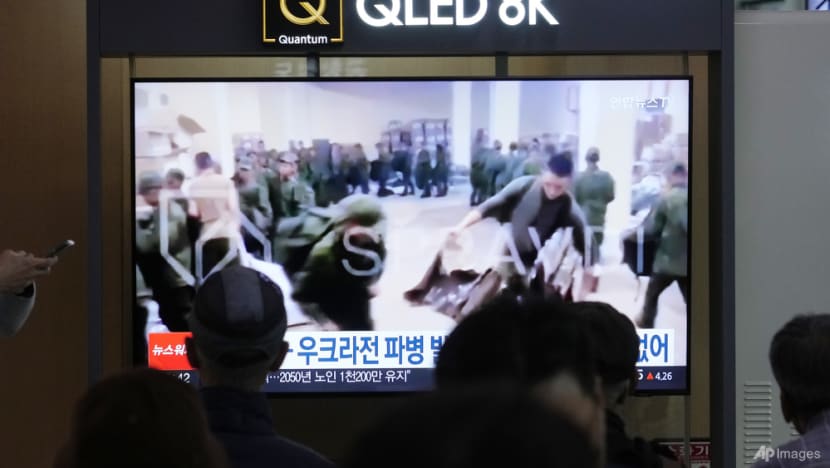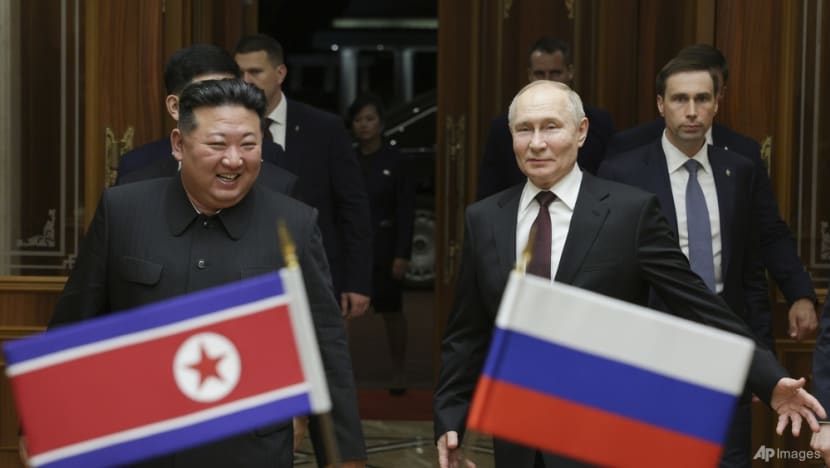Commentary: Why North Korean troops in Russia are raising concerns in South Korea
South Korea may reconsider sending weapons to Ukraine, after North Korea sent troops to Russia. There is little else it can do, says Pusan National University’s Robert Kelly.

A TV screen shows an image of soldiers believed to be from North Korea standing in line to receive supplies from Russia, on Oct 21, 2024. (Photo: AP/Ahn Young-joon)

This audio is generated by an AI tool.
BUSAN: The United States confirmed on Wednesday (Oct 23) what South Korea and Ukraine have been anxiously calling attention to for days – that North Korea has sent troops to Russia.
A Russian ally providing direct military support for its illegal invasion of Ukraine would be an escalation of the war.
Previous foreign participants on the Russian side have mostly been nationals from underdeveloped countries acting on their own, usually for individual financial reasons. North Korean participation, by contrast, has been ordered by the nation’s leader Kim Jong Un.
Ukrainian intelligence service said on Thursday that these North Korean forces have been deployed in Russia’s Kursk region, which could be to fight back Ukraine’s August incursion. If so, they would be fighting in Russian, not Ukrainian, territory.
This permits at least the fiction of defence and alliance for Russian President Vladimir Putin.
SOUTH KOREA’S INTENSIFYING CONCERNS
South Korea has tried for a long time to keep Russia out of the Korean peninsula’s division without openly alienating Moscow.
Seoul responded circumspectly as Putin and Kim met earlier in June to elevate its bilateral ties to a strategic partnership – which, among other things, obliges “military and other assistance with all means in its possession without delay” if either party is in a state of war. On Thursday, Russian lawmakers voted unanimously to ratify the treaty.
But Seoul’s response has intensified as evidence of a deeper alignment has surfaced. There are several areas of growing concern for South Korea.
First and foremost is the quid pro quo behind the first foreign deployment of North Korean troops, with widespread suspicion that they are a swap for Russian assistance to substantially turbocharge Pyongyang’s missile and nuclear programme.
Then there is the modern combat training and experience North Korean soldiers will receive in the Ukraine war, and the fears of a matching Russian deployment to North Korea one day.
THE UPSIDE FOR RUSSIA
There are clear upsides for Moscow to use North Korean fighters. Putin has tried hard to distance the conflict from Russia’s ethnic Russian middle class, whom he is reluctant to have to mobilise.
These residents of Russia’s largest cities provide the core domestic support for Putin’s regime. They accept the basic regime bargain of political quiescence in exchange for political and economic stability – but this has been threatened by the unexpectedly long war.
Russia has heavily relied on non-Russian ethnic minorities, prisoners and foreign fighters. North Korean soldiers are part of that general outsourcing effort.
These efforts are likely enough to retain current territorial gains but Russia will not win the war without a larger, inevitably Russian army. Nuclear weapons use would, of course, open space for an immediate victory, but the diplomatic costs are so massive that Putin has not done this.
At this point, it looks like Putin is buying time till the United States presidential election to see how the cards fall for him.
THE NORTH KOREAN END OF THE BARGAIN
The North Korean end of the bargain is better, if it does get a technological assist from Russia. A lengthy stalemate also sends home a nice monthly “stipend”, paid to the government not the soldiers. They will likely receive a fraction of their earnings, if they make it back at all.
Russia has used foreigners and prisoners for its human wave attacks, what the Ukrainians call "meat assaults". Russia’s casualties in the war have been enormous; Western estimates suggest over 1,000 per day just this past September. Russian generals continue to treat the war as a question of quantity, which helped power the Soviet Union to victory in World War II.
The North Koreans are expected to be forced into this meat grinder, with grave consequences probably promised for those considering desertion or defection.
But this is likely irrelevant to Kim and Putin, who are ideologically alike. Both deeply resent Western power and America’s forward basing in their regions. Both are also wary of over-dependence on China, which does not fully support their revisionist, anti-Western goals. This is an alliance of convenience, but one that especially benefits North Korea, the weaker partner.
WHAT CAN SOUTH KOREA DO ABOUT IT?
But what can South Korea do about this, besides summoning the Russian ambassador and calling for the immediate withdrawal of North Korean troops? Probably not much.
South Korea will not deploy its own forces to Ukraine. No democracy has for fear of prodding Putin toward nuclear escalation.
But South Korean President Yoon Suk Yeol has now said that it would “review” its ban on direct lethal aid to Ukraine. He warned that Seoul “won’t sit idle”.
South Korea has a large, high-quality defence industrial base, so Putin has repeatedly threatened South Korea not to take this step. But Putin’s increasingly alignment with North Korea undercuts these threats.
South Korea now has little to lose by more openly supporting Ukraine. South Korean armaments vastly outclass what North Korea has to offer. Putin may well regret this desperate decision to accept North Korean soldiers.
Robert Kelly (@Robert_E_Kelly) is a professor of political science at Pusan National University.


















